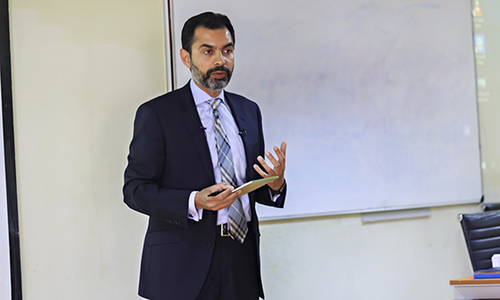PTI MNA and former finance minister Asad Umar on Thursday criticised the idea of introducing amnesty schemes to enable citizens to whiten undisclosed assets, saying they show the "weakness of state" against tax evaders.
Umar, who was chairing a meeting of the National Assembly's Standing Committee on Finance, while referring to the value of overseas assets of Pakistani nationals identified by the Federal Board of Revenue (FBR) noted that "only Rs1 billion" were recovered out of the total Rs800bn despite the introduction of amnesty schemes.
Editorial: Tax amnesty again
He said that a total of $5.5bn were laundered out of the country and used to purchase properties abroad.
"Under amnesty schemes, criminals are told that the state is helpless against you," he added.
During the meeting, FBR Chairman Shabbar Zaidi while briefing the committee said that out of the total 325 Pakistani nationals who had assets abroad, some have availed amnesty schemes. However, he added, no politician holding public office has availed the schemes.
He clarified that the 325 people evaded tax but did not launder money as they transferred dollars abroad under a provision of the law.
According to Zaidi, action had been initiated in all 325 cases involving overseas properties out of which 135 individuals later opted for the tax amnesty scheme offered by the PML-N government in 2018 while 56 people availed the scheme rolled out by the PTI government in 2019.
The FBR chairman said that black money worth Rs62bn was whitened in 2018 while Rs31.78bn was whitened in 2019. He said that 115 cases out of the total 325 are still pending.
The chairman revealed that the board had received data about Pakistanis' overseas assets from 45 countries while data from 19 countries is awaited.
During the meeting, Umar while noting the absence of Adviser to Prime Minister on Finance Dr Abdul Hafeez Shaikh said that the adviser did not participate in any meeting of the committee since the PTI government took office. Comparing with the past governments, he said that Shaikh, the then finance minister, had attended 18 out of the total 62 meetings of the committee during the PPP tenure while the PML-N's finance minister had attended 17 meetings out of the total 72 during his tenure.
FATF action plan
Federal Minister for Economic Affairs Hammad Azhar also attended the meeting and briefed the committee on the developments that took place in the last session of the Financial Action Task Force (FATF).
He said the country was taking timely measures to achieve the targets set by the FATF. Giving the example of Indonesia, he said that the country had pushed itself out of the FATF 'grey list' through documenting its economy. Pakistan is striving hard to follow the same pattern, he added.
The minister said that Pakistan was given the International Country Risk Guide (ICRG) plan in February 2018. There was no development on 22 points of the 27-points action plan when the Pakistan Tehreek-i-Insaf (PTI) government assumed power, he added.
The government has acted upon 17 points of the plan so far, Azhar said, adding that the country will submit its final report on January 7 as the FATF has to decide the matter in February 2020.
He said that the government's economic team wants to complete the ICRG plan by next year and technical consultants have already been appointed to help facilitate this. The International Monetary Fund (IMF), Asian Development Bank (ADB) and World Bank are supporting Pakistan in this regard, he added.
The minister termed the ICRG action plan as challenging, saying a lot needs to be done under it. He said that the government is establishing an FATF secretariat and is working on completing all 27 points of the plan.
Detailing the requirements of the FATF, he said that the watchdog wants a more effective implementation of the mechanism to curb suspicious transactions.















































